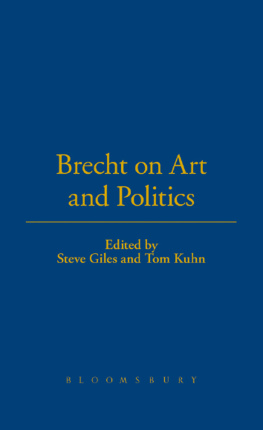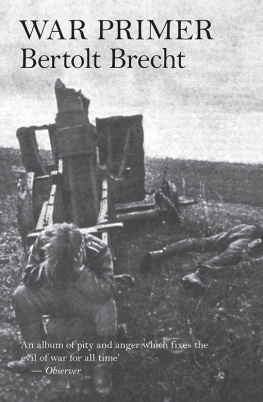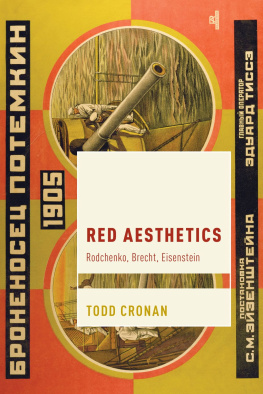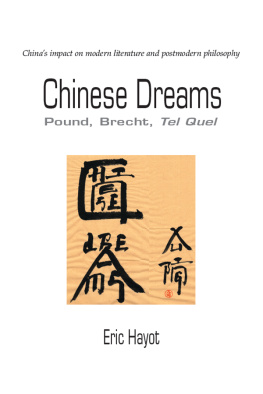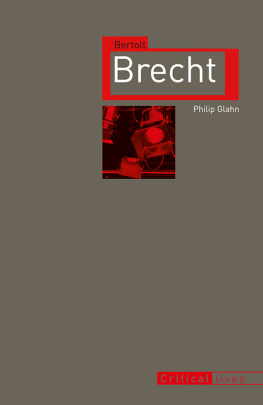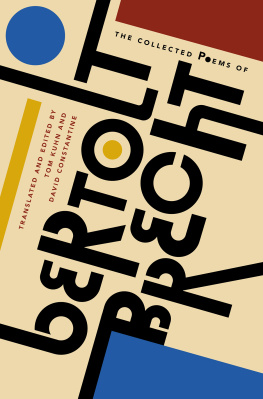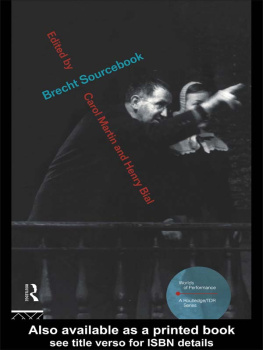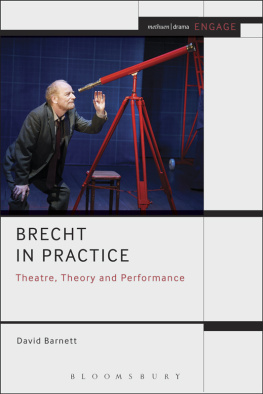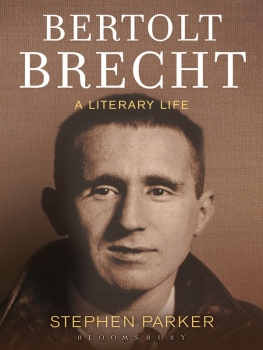Brecht - Brecht On Art And Politics
Here you can read online Brecht - Brecht On Art And Politics full text of the book (entire story) in english for free. Download pdf and epub, get meaning, cover and reviews about this ebook. year: 2014, publisher: Bloomsbury UK, genre: Art. Description of the work, (preface) as well as reviews are available. Best literature library LitArk.com created for fans of good reading and offers a wide selection of genres:
Romance novel
Science fiction
Adventure
Detective
Science
History
Home and family
Prose
Art
Politics
Computer
Non-fiction
Religion
Business
Children
Humor
Choose a favorite category and find really read worthwhile books. Enjoy immersion in the world of imagination, feel the emotions of the characters or learn something new for yourself, make an fascinating discovery.
Brecht On Art And Politics: summary, description and annotation
We offer to read an annotation, description, summary or preface (depends on what the author of the book "Brecht On Art And Politics" wrote himself). If you haven't found the necessary information about the book — write in the comments, we will try to find it.
Brecht On Art And Politics — read online for free the complete book (whole text) full work
Below is the text of the book, divided by pages. System saving the place of the last page read, allows you to conveniently read the book "Brecht On Art And Politics" online for free, without having to search again every time where you left off. Put a bookmark, and you can go to the page where you finished reading at any time.
Font size:
Interval:
Bookmark:
Bertolt Brecht was born in Augsburg on 10 February 1898 and died in Berlin on 14 August 1956. He grew to maturity as a playwright in the frenetic years of the twenties and early thirties, with such plays as Man Equals Man, The Threepenny Opera and The Mother. He left Germany when Hitler came to power in 1933, eventually reaching the United States in 1941, where he remained until 1947. It was during this period of exile that such masterpieces as Life of Galileo, Mother Courage and her Children and The Caucasian Chalk Circle were written. Shortly after his return to Europe in 1947, he founded the Berliner Ensemble, and from then until his death was mainly occupied in producing his own plays.
Other Bertolt Brecht publications by Bloomsbury Methuen Drama
Brecht Collected Plays: One
(Baal, Drums in the Night, In the Jungle of Cities, The Life of Edward II of England, A Respectable Wedding, The Beggar or the Dead Dog, Driving Out a Devil, Lux in Tenebris, The Catch)
Brecht Collected Plays: Two
(Man Equals Man, The Elephant Calf, The Threepenny Opera, The Rise and Fall of the City of Mahagonny, The Seven Deadly Sins)
Brecht Collected Plays: Three
(Lindberghs Flight, The Baden-Baden Lesson on Consent, He Said Yes/He Said No, The Decision, The Mother, The Exception and the Rule, The Horations and the Curiatians, St Joan of the Stockyards)
Brecht Collected Plays: Four
(Round Heads and Pointed Heads, Fear and Misery of the Third Reich, SeoraCarrarsRifles, Dansen, How Much Is Your Iron?, The Trial of Lucullus)
Brecht Collected Plays: Five
(Life of Galileo, Mother Courage and Her Children)
Brecht Collected Plays: Six
(The Good Person of Szechwan, The Resistible Rise of Arturo Ui, Mr Puntila and His Man Matti)
Brecht Collected Plays: Seven
(The Visions of Simone Machard, Schweyk in the Second World War, The Caucasian Chalk Circle, The Duchess of Malfi)
Brecht Collected Plays: Eight
(The Days of the Commune, The Antigone of Sophocles, Turandot or the Whitewashers Congress)
Berliner Ensemble Adaptationspublishing 2014
(The Tutor, Coriolanus, The Trial of Joan of Arc at Rouen 1431, Don Juan, Trumpets and Drums)
Bertolt Brecht Journals, 1934-55
Brecht on Art and Politics
Brecht on Art and Politics
Brecht on Performance publishing 2014
Brecht on Theatre publishing 2014
Brecht in Practice publishing 2014
The Craft of Theatre: Seminars and Discussions in Brechtian Theatre
Brecht, Music and Culture publishing 2014
Brecht in Context
The Theatre of Bertolt Brecht
Brecht: A Choice of Evils
Bertolt Brecht: A Literary Life publishing 2014
A Guide to the Plays of Bertolt Brecht

Bloomsbury Methuen Drama
An imprint of Bloomsbury Publishing Plc
Imprint previously known as Methuen Drama
| 50 Bedford Square | 1385 Broadway |
| London | New York |
| WC1B 3DP | NY 10018 |
| UK | USA |
www.bloomsbury.com
BLOOMSBURY, METHUEN DRAMA and the Diana logo are trademarks of Bloomsbury Publishing Plc
First published by Methuen Drama in 2003
Methuen Drama series editor for Bertolt Brecht: Tom Kuhn
Translations of texts by Brecht copyright Brecht Heirs
Texts by Brecht originally published in Bertolt Brecht Grosse Kommentierte BerlinerUnd Frankfurter Ausgabe copyright Suhrkamp Verlag, Frankfurt am Main 1988-2000
Translations: Parts One, Three and Five Laura Bradley and Tom Kuhn; Parts Two and Four Steve Giles, with the exception of the following in Part Five: no. 61 The Other Germany (translation Eric Russell Bentley); nos. 69-71, the pieces on formalism (translation Steve Giles); and no. The Discussion about the Condemnation of Lucullus (translation John Willett from Collected Plays 4). The translators have asserted their rights under the Copyright, Designs and Patents Act, 1988, to be identified as translators of this work.
Selections, introductions, notes and commentaries of this work copyright 2003 by Tom Kuhn and Steve Giles. Tom Kuhn, Steve Giles, Stephen Parker, Matthew Philpotts and Peter Davies have asserted their rights to be identified as the authors of the various introductions, notes and commentaries of this work.
Bertolt-Brecht-Erben / Suhrkamp Verlag
All rights reserved. No part of this publication may be reproduced or transmitted in any form or by any means, electronic or mechanical, including photocopying, recording, or any information storage or retrieval system, without prior permission in writing from the publishers.
No responsibility for loss caused to any individual or organization acting on or refraining from action as a result of the material in this publication can be accepted by Bloomsbury or the author.
This version of the text went to print before the end of rehearsals and may differ slightly from the version performed.
All rights whatsoever in this play are strictly reserved. Application for all performance rights for professional stage production throughout the world except USA should be addressed to Alan Brodie Representation Ltd, Paddock Suite, The Courtyard, 55 Charterhouse Street, London EC1M 6HA, UK, and for amateur stage production to Samuel French Ltd, 52 Fitzroy Street, London W1P 6JR, UK. In the USA application should be addressed to Richard Garmise, Fitelson Lasky Aslan and Couture, 551 Fifth Avenue, New York, NY 10176, USA. No performance may be given unless a licence has been obtained.
No rights in incidental music or songs contained in the work are hereby granted and performance rights for any performance/presentation whatsoever must be obtained from the respective copyright owners.
British Library Cataloguing-in-Publication Data
A catalogue record for this book is available from the British Library.
| ISBN: HB: | 978-0-4137-5890-3 |
| ePDF: | 978-1-4742-4333-9 |
| ePub: | 978-1-4742-4334-6 |
Library of Congress Cataloging-in-Publication Data
A catalog record for this book is available from the Library of Congress.
Series: Diaries, Letters and Essays
Typeset by SX Composing DTP, Rayleigh, Essex
Waste no thought on
That which cannot be changed!
(BFA 14/154)
There is an aspect to Bertolt Brecht which has too long remained inaccessible to an English-speaking readership. Brecht is known, as well as for his poems and plays, above all for his theory of the theatre, outlined in John Willetts ground-breaking selection, Brecht on Theatre (first published in 1964) and in The Messingkauf Dialogues (1965). The theatre theory is, however, just a fragment. The writings presented here (nearly all of which appear in English for the first time) reveal one of the twentieth centurys most innovative, entertaining and thought-provoking writers reflecting on a far wider range of cultural, aesthetic and political concerns. To read the Brecht of these pages is to experience a dynamic intellect, radically engaged with social, political and cultural processes, convinced that the world needs change, and that we can change it.
The most commonplace misapprehension about Brechts theory is that there is some single body of doctrine about a simple set of concerns. There is not. A very large proportion of his writings is about the theatre, but even here his ideas are continually changing and shifting their ground and their emphases. And elsewhere the texts that have survived (over two thousand pages of Schriften in the new German edition) are a bewildering array of essays, speeches, short sketches and fragments, thoughts without contexts, published and unpublished bits of ideas, to which we can often only cautiously ascribe a chronology, let alone a single philosophy. To a certain extent we might wish to account for the variety and confusion in terms of Brechts personal intellectual habits: he had a lively, alert, sometimes slippery intellect; he enjoyed a good opinion, relished a And he increasingly came to think of the divorce of theory from practice as a problem of bourgeois philosophy; for him, theory was to be inseparable from practice, whether in the theatre or in the political resistance to Nazism. For the modern Marxist, philosophy could not be simply a question of cooking up theories about a fixed object and an unchanging world. On the contrary, the ideas had to be able to intervene and participate in the reality (the fragmented, collectivist, late capitalist reality), just as the reality intervenes in the ideas. Both had to be amenable to change. Change and contradiction become key categories in Brechts thinking.
Font size:
Interval:
Bookmark:
Similar books «Brecht On Art And Politics»
Look at similar books to Brecht On Art And Politics. We have selected literature similar in name and meaning in the hope of providing readers with more options to find new, interesting, not yet read works.
Discussion, reviews of the book Brecht On Art And Politics and just readers' own opinions. Leave your comments, write what you think about the work, its meaning or the main characters. Specify what exactly you liked and what you didn't like, and why you think so.

